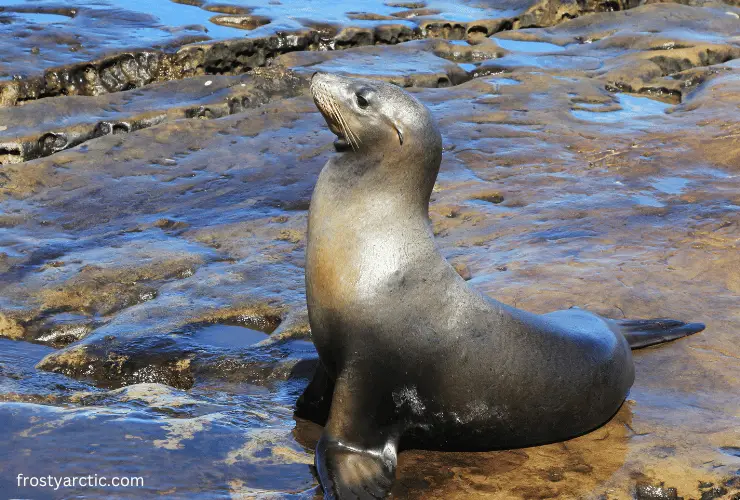Yes, you can eat sea lions. In some parts of the world, consuming sea lions is legal and culturally acceptable. Sea lions are nutritious and have several health benefits. However, the consumption of seals is controversial, and many organizations are working to protect sea lions.
Sea lion meat is considered a delicacy in several cultures. But is it safe to eat sea lions? Let’s find out in the article below!
Can Humans Eat Sea Lion Meat?
Yes, humans can eat sea lion meat. In fact, it is a common practice in Inuit and Indigenous cultures.
Along the coast of North America, communities hunt and consume seals, a cultural tradition they have been following for centuries.
Sea lion meat is popular among these communities because of its nutritional value.
Tip: Like other kinds of meat, cooking sea lion meat properly is critical to eliminating harmful bacteria. Not cooking may increase the risk of contamination and diseases in humans.
The fat layer (or blubber) of sea lions is highly nutritious. Many Indigenous communities consume it raw or cook the meat to create unique dishes.
Although sea lion consumption is safe, it remains a controversial issue. Many animal welfare activists argue that sea lion consumption is inhumane and may cause sea lion populations to decrease.
So, many laws and acts have been enforced for the welfare of these animals. For instance, the Mammal Protection Act in the United States prohibits hunting of the majority of mammals, including sea lions. ~ AREW.org
Can You Eat Sea Lion Raw? Risks of Eating Sea Lion Meat

Indigenous communities sometimes consume sea lion meat raw, but health experts warn against it. Eating uncooked sea lion meat increases the risk of contamination and diseases, making it unsafe for raw consumption.
Here are some risks of eating sea lion meat:
1. Parasites
Because sea lions live in aquatic environments, they may harbor parasites such as trematodes, nematodes, cestodes, and acanthocephalans. Humans may ingest these parasites if raw contaminated meat is consumed, infecting multiple organs.
Research suggests that humans who consume this meat may experience abdominal pain, diarrhea, nausea, and fever.
2. Bacteria
Sea lions may also host certain kinds of bacteria. Common types of bacteria include Salmonella, Campylobacter, Brucella, Leptospira, and Mycoplasma, which cause infections like gastroenteritis, septicemia, and chronic diseases in humans.
In most cases, consuming contaminated meat or exposure to sea lions may transmit bacterial infections.
3. Viruses
Studies on sea lions have revealed that these aquatic mammals can carry viruses such as caliciviruses, influenza viruses, herpesviruses, and papillomaviruses.
Eating sea lion meat is considered unsafe because if these viruses are transmitted to humans, it could lead to respiratory, gastrointestinal, neurological, and skin disorders in sea lions and humans. Ingesting contaminated sea lion meat or fluids can transmit these infections.
4. Toxins
Researchers also advise against consuming raw sea lion meat because these marine mammals may accumulate toxins from their diet, like domoic acid and persistent organic pollutants (POPs), which can cause amnesic shellfish poisoning.
In the worst cases, the toxins might disrupt human health by impacting the endocrine system and causing cancer.
For these reasons, properly cooking muscle meat is essential to eliminating parasites, bacteria, viruses, and toxins.
What Does Sea Lion Meat Taste Like?
Sea lion meat has a distinctive fishy flavor. With a rough texture, sea lion meat is usually used in stews, soups, jerky, and sausages.
Tip: You must consume sea lion meat within three days after harvesting it.
According to most sea lion meat consumers, it tastes similar to beef or lamb, while its texture is just like that of veal. The tender meat improves further during cooking.
Sea lion meat is also often characterized by a fishy or gamey taste and a texture like duck meat or veal. The meat is rich in iron and contains omega-3 fatty acids.
The health advantages of consuming sea lion meat include:
Nutritional Value of Sea Lion Meat

The nutritional value of sea lion meat is mentioned below for a serving of 100 grams:
| Energy: 120 Calories 100g serving | |
| Protein | 26 g |
| Fat | 2 g |
| Carbohydrate | 0 g |
| Dietary Fiber | 0 g |
| Cholesterol | 64 mg |
| Sodium | 62 mg |
| Potassium | 406 mg |
| Iron | 11.5 mg |
| Selenium | 111.8 µg |
Sea lion meat and blubber contain protein and beneficial fats in high amounts. This includes vital omega-3 fatty acids essential for cardiovascular and cognitive health.
Let’s learn more about the health benefits of consuming sea lion meat:
- Weight Management and Muscle Building: Because of its high-protein, low-carbohydrate, and low-fat food content, sea lion meat contributes to weight management and muscle enhancement.
- Rich Iron Source: Being rich in iron means sea lion meat facilitates red blood cell formation and efficient oxygen transportation.
- Antioxidant Selenium: Sea lion meat is high in selenium, an antioxidant that aids immune system functionality and thyroid health.
- Weight Loss: A high protein-energy ratio (P: E) means you consume more protein per calorie, which increases diet quality and helps with weight loss.
However, when consuming sea lion meat, it is critical to consider how it may affect the environment. Consuming sea lions could make things worse for these aquatic creatures by decreasing their populations and upsetting the marine ecosystem.
How to Prepare Sea Lion Meat? Sea Lion Recipes
One of the most popular ways of cooking sea lion meat is boiling it. It’s a quick and easy way to cook meat, and it ensures the removal of any present contaminants.
Drying sea lion meat could help preserve it longer, making it another top method of cooking sea lions.
Some consumers prefer making sea lion jerky by slicing the meat into thin pieces, drying them under the sun, or using a food dehydrator. Salt and preferred spices can be added to the dried delicacy to enhance its flavor.
Sea lion steaks could be prepared by grilling or pan-frying until fully cooked. Sometimes, sea lion roast is prepared by rubbing the meat with a mixture of garlic powder, salt, and pepper and roasting it in a pan with onions, potatoes, and carrots.
Did you know?
Blubber Fry Bread is a famous delicacy prepared by blending fat with flour and water to create dough. The dough is then fried in oil until it becomes crispy and golden brown. ~ chugachheritageak.org
FAQs
Which countries eat sea lion meat?
In Greenland, Canada, and Alaska, consuming sea lions is a cultural practice. However, eating sea lions in America is illegal because of the Mammal Protection Act.
Do sea lions make milk?
Female sea lions feed their babies rich milk from special glands. The pups nurse by sucking from their mom’s teats and using sounds to tell her when they’re hungry.
Who eats sea lions?
Killer whales, sharks, and humans hunt and consume sea lions. Humans have hunted sea lions for food, oil, skin, and bones.
Conclusion
Sea lion meat is rich in nutrients and has been consumed by indigenous communities for centuries, but this does not make it safe for consumption. Sea lions may carry diseases, parasites, toxins, and contaminants that may harm human health.
Plus, many animal rights activists do not consider hunting sea lions ethical. So, sea lions must be consumed in moderation and only if properly cooked.



1 thought on “Can You Eat Sea Lions? How Does it Taste Like?”